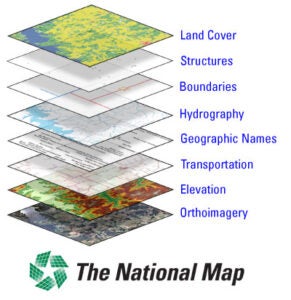Explore the World Through Precision: Unleashing the Power of Geographic Information Systems (GIS) in Marshall’s Cutting-Edge Geography Department Program!
What is Geospatial Information Science (GIScience)? In a nutshell, GIScience is about using mapped data to solve problems and make better decisions.
A degree in geography from Marshall University is an excellent preparation for becoming a GIS analyst because it provides a strong foundation in the spatial analysis, data management, and cartography skills needed in GIS, as well as an understanding of the physical and human geography that underlies the data. This prepares students to work with the complex data sets used in GIS and to apply their knowledge to solve real-world problems in fields such as environmental science, urban planning, and business. Additionally, the interdisciplinary nature of geography makes graduates well-rounded and adaptable to a variety of industries, which is crucial in a rapidly changing job market. Our GIS program prepares students for success in this field, with a curriculum that includes courses in cartography, GIS, remote sensing, and spatial analysis, as well as opportunities for hands-on experience through internships and research projects.
The list of industry and government applications of GIS is limitless: precision farming, archaeological site inventory, transportation and urban planning for sustainability, wildlife tracking, self-driving cars, new business locations to maximize profitability, utility line mapping and maintenance, supply chain and logistics, pollution modeling, crime mapping, military intelligence and operations, disaster prevention and mitigation, renewable energy site selection, forest health, pandemic tracking, emergency services response, oil and gas drilling, local tax assessor maps, surveying, and the list goes on…
The Geography Department offers a wide variety of courses in Geographic Information Systems and Technology (GIST), including GIS, Remote Sensing (RS) and related geospatial technologies such as drones and GPS/GNSS. Your BS degree in Geography with a GIScience Area of Emphasis will include training with GIScience technologies and prepares your for a wide range of jobs in many industries. Earn your degree in the classroom or 100% online!
Undergraduate options for GIScience
BS Geography – Area of Emphasis in GIScience
Undergraduate students specializing in the Geospatial Information Science (GIScience) area of emphasis must complete the Geography Core Requirements (which includes Cartography and Principles of GIS) and the following additional GIScience courses:
- GEO 431 Remote Sensing and Photogrammetry (3 credit hours)
- Technologies: Choose at least six credits from: GEO 110 Basic GIS (1 credit), GEO 111 Air Photos and Satellite lmagery (1 credit), GEO 112 Smartphone GPS (1 credit), GEO 113 Web GIS (1 credit), GEO223 Digital Earth (4 credits), GEO 454 Drones: Remote Sensing & GIS, GEO485-488 Independent Study (GIS/RS topics only; 1-4 credits)
- Analysis and Applications: Choose a minimum of six credits from: GEO 427 Programming GIS, GEO 429 Location Analysis and GIS (4 credits), GEO 430 Environmental Raster Analysis (4 credits), GEO434 Flood Hazards and GIS (3 credits), GEO 440 Spatial Statistics and GIS (4 credits), GEO485-488 Independent Study (GIS/RS topics only; 1-4 credits), GEO 490 Internship (1-6 credits)
- Electives: Choose additional GIScience (GEO) courses to reach a minimum of 21 credit hours beyond the Geography Core Requirements.
GIScience Undergraduate Certificate or Minor
See the GIScience undergraduate minor/certificate page for more information.
Our latest Geospatial information science technology course features drones for Remote Sensing and GIS.
Graduate options for GIScience
MA Geography emphasizing GIScience
Graduate students specializing in the Geospatial Information Science (GIScience) must complete the Geography Core Requirements (which includes at least one GIScience course) and then select from following additional GIScience courses as you complete your MA Geography requirements:
- GEO523 Cartography and GIS (4 credits)
- GEO526 Principles of GIS (4 credits)
- GEO527 Programming GIS (4 credits)
- GEO529 Location Analysis and GIS (4 credits)
- GEO530 Environmental Raster Analysis (4 credits)
- GEO531 Remote Sensing and Photogrammetry (4 credit hours)
- GEO534 Flood Hazards and GIS (3 credits)
- GEO554 Drones: Remote Sensing & GIS (3 credits)
- GEO540 Spatial Statistics and GIS (4 credits)
- GEO585-588 Independent Study (GIS/RS topics only; 1-4 credits)
- GEO690 Internship (1-6 credits)
GIScience Graduate Certificate or Minor
See the GIScience graduate certificate page for more information.
